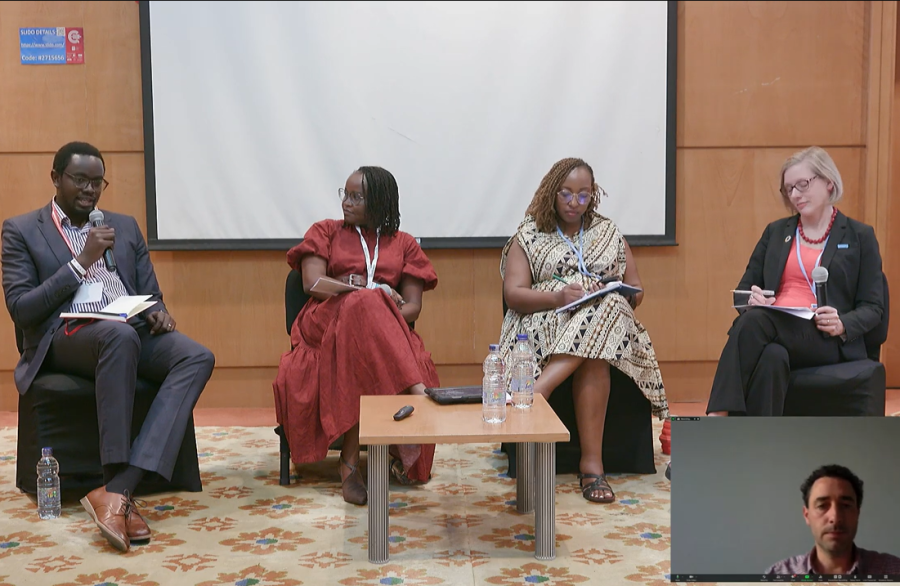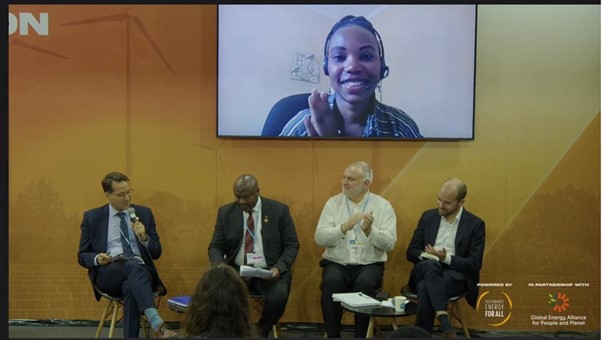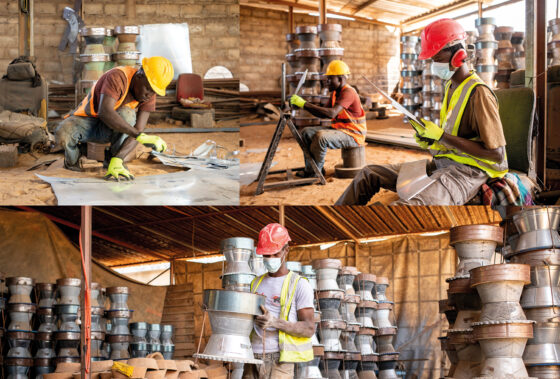“Adaptation to climate change should get more attention”

The 27th Conference of the Parties to the UNFCCC (COP27) was held in Sharm El-Sheikh, Egypt, from November 6-20, 2022. Discussions focused on finding solutions to avoid exceeding the 1.5 degree limit.
Strategies for action were presented in numerous high-level and side events, key negotiations, and press conferences, and followed by over 35,0000 participants from various sectors. EnDev participated in several events around the COP27 in its role as one of the largest programmes for modern and renewable energy access.
Designing equitable energy systems across social divisions
– Friday, 11.11.2022
In a panel discussion on 11th November organised by Oxford Climate Compatible Growth Programme, EnDev Programme Director Alexander Haack joined Smantha Stratton-Shorts (UNOPS), Elizabeth Wangeci Chege (SE4All), and Edwin Obiero (Practical Action) to discuss the “Power of Inclusion”. The session was led by Makena Ireri, Director of Energy at CLASP. She opened the discussion with the statement, that organizations should “start with the needs that the marginalised groups themselves identify with, then build from there to find solutions, rather than coming with the ‘street lights’ to begin with – a top-down approach.” The panelists agreed, that cross-cutting issues such as gender equality are critical to the successful implementation of climate action. In fact, they are critical to building truly sustainable and climate-resilient energy systems. Alexander Haack explained that EnDev is already working on various aspects of inclusion that touch on the Leave No One Behind (LNOB) Agenda and that targeted tools based on the Gender Strategy are in place. He stated, that “changing the mindset more towards saying diversity is something [which] creates a diverse setup of opportunities […] then you will suddenly realise that a lot of people have a lot in common with your project, or the target you want to achieve.” Elizabeth Wangeci Chege said: “Understanding the different levels of Knowledge Awareness – if you are going to have a stakeholder participating, they need to be empowered first of all.” Mr Haack said: “When you look at the ratio of emission reductions that you can achieve vs how much people are affected by climate change in the countries that we’re working in, adaptation should get more attention.”
In this year´s COP, EnDev set a special focus on Malawi. Khadija Mussa, Energy and Policy Advisor at EnDev, was invited to participate virtually on behalf of EnDev Malawi in three of their sessions. Sustainable Energy for All (SEforALL), together with the Global Energy Alliance for People and Planet (GEAPP), hosted the SDG7 pavilion at COP27.
The Twin Opportunity of Integrated Energy Planning: Access to Electricity Spurring a Clean eCooking Transition
– Saturday, 12.11.2022
Under the headline “The Twin Opportunity of Integrated Energy Planning: Access to Electricity Spurring a Clean eCooking Transition”, Khadija shared practical experiences with the recently launched Malawi Integrated Energy Planning (IEP), highlighting that the IEP eases programming in general and in particular for eCooking, but that Cleaning the Cooking Stack should still include solutions for more efficient biomass consumption. On the panel, organised by Modern Energy Cooking Services (MECS) and SEforALL, were also representatives of EU, GEAPP, AfDB and MCFA.
African Youth and Women Leadership for a Global Clean Energy Transition
– Monday, 14.11.2022
On Monday, the “Gender Day” at COP, Khadija Mussa spoke on a high-level panel titled “African Youth and Women Leadership for a Global Clean Energy Transition”. On this panel, Khadija spoke about the active roles that women and youth could have as enablers and ambassadors of a just and equitable energy transition (JEET) in Africa, in line with the 7 transformative actions for SDG7 outlined in the Kigali Communiqué. Her input was centred around her role as a youth leader and young woman in the energy space, leading EnDev projects that contribute to JEET through cleaner cooking, off-grid solar electrification and solar cold chain solutions to provide improved cooking, lighting and healthcare solutions that leaves no one behind in rural Malawi. Also on this panel with Khadija were other African women serving as ambassadors of JEET in high levels, who were H.E. Samira Bawumia (the Second Lady of Ghana), H.E. Aissatou Sophie Gladima (Senegal’s Minister of Petroleum and Energy), H.E. Dr Jeanne d’Arc Mujawamariya (Rwanda’s Minister of Environment), Dr. Faith Wandera Odongo (Deputy Director for Renewable Energy in Kenya’s Ministry of Energy), and Ms. Raïnatou Coulibaly (Electrical Engineer in Benin’s Ministry of Energy).
Data-driven Transitions: A Spotlight on Malawi’s Ambitious Access and Transition Plans
– Tuesday, 15.11.2022
On Tuesday, the Government of Malawi and SEforALL hosted a session about “Data-driven Transitions: A Spotlight on Malawi’s Ambitious Access and Transition Plans”. On this panel, Khadija outlined the role that EnDev Malawi played as a thought partner in the development of Malawi’s IEP as a programme with a longstanding footprint in supporting the government of Malawi in the sustainable energy sector for cleaner cooking, off-grid solar solutions and more recently, energising healthcare. As part of this overview, she also demonstrated how EnDev Malawi was one of the first entities to benefit from the data generated by the IEP to identify health facilities that will benefit from its BMZ-funded “Energising Health” project to solarise 93 health facilities and provide 184 solar direct-drive (SDD) refrigerators for COVID-19 vaccination storage in an effort to reach the last mile and leave no one behind in COVID-19 response healthcare. This panel was composed of Malawi Government’s Minister of Energy, Hon. Ibrahim Matola, together with representatives of MECS and GEAPP.
SDG7 and Cooling for All: Delivering Solutions at the Last Mile #ThisIsCool
– Wednesday, 16.11.2022
EnDev’s “Energising Health” project was highlighted on the “SDG7 and Cooling for All: Delivering Solutions at the Last Mile #ThisIsCool” panel by a representative of the Malawi Government. Mr. Mphatso Mtenje, National Cold Chain Manager for the Ministry of Health, demonstrated the need for, and benefit of, sustainable cooling solutions and health facility electrification for basic service provision in last mile interventions such as vaccination efforts in a low energy access country such as Malawi. As the Malawi Government uses the IEP to inform plans for electrification and cold chain expansion across the country until 2030, the “Energising Health” project is contributing to the government’s efforts to turn vaccines into vaccinations and meet national immunization targets in a more sustainable and effective way. On this panel were also representatives of CLASP, the World Bank, Kenya’s National Ozone Unit and Carbon Trust.


